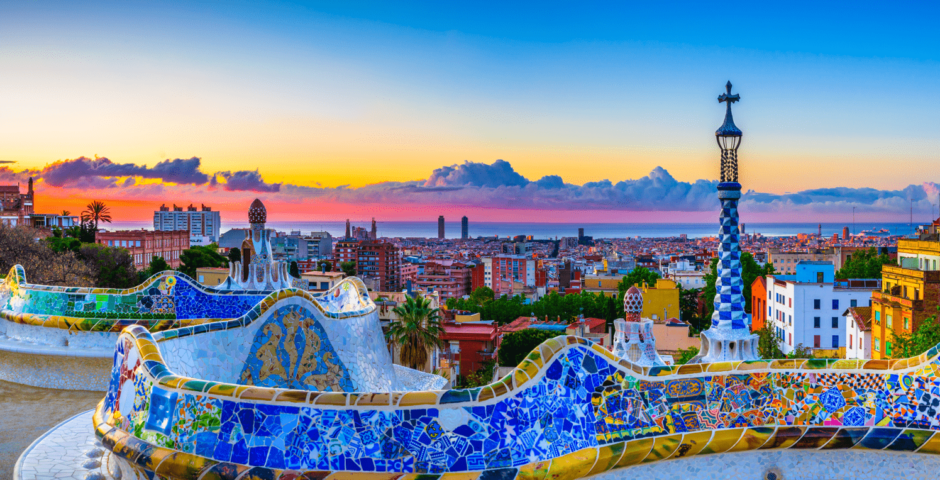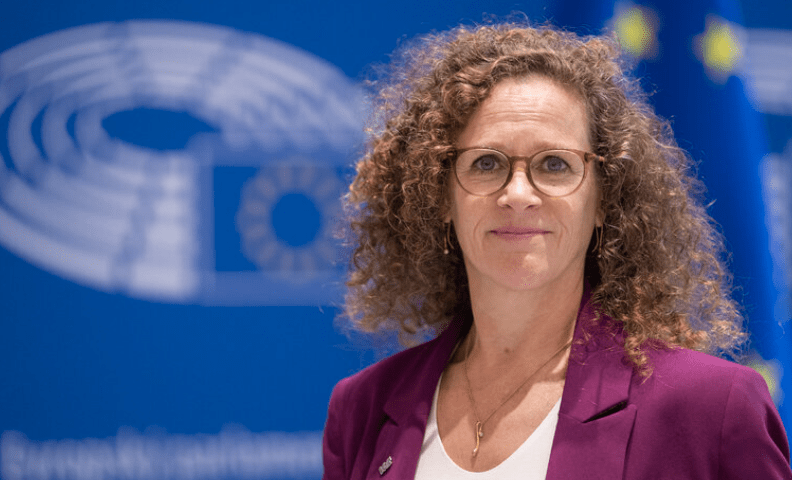Profile of EU Member Spain: Great European ambitions, but nationally divided

A country in which national politics is on edge but that wants to become more prominent at the EU level.

Spain, the European Union (EU) Member State in Southern Europe on the Iberian Peninsula. Known as a popular holiday destination with high temperatures, but at the same time also for its fight against climate change. The country has four official regional languages besides the official Spanish national language (Castilian). Politically, a lot is going on in Spain at the moment. After the national elections in the summer, there has been political unrest in Spain for months. The ongoing issue of Catalan independence has been the subject of political discussion for years, but recently, it has once again dominated the political agenda. At the same time as national political unrest, Spain held the rotating presidency of the Council of the European Union from July to December 2023. This country profile looks at the national political situation in Spain, its history with the EU and its current position in the EU. It also looks back on previous elections for the European Parliament and looks ahead to the upcoming elections in June.
Geography and demography
Spain is located in southwestern Europe and forms, together with Portugal, the Iberian Peninsula. The capital is Madrid. Spain consists of seventeen autonomous communities. Most of these communities are divided into provincias (counties), which in turn are subdivided into comarcas (regions). These comarcas are further subdivided into municipios (municipalities). This makes Spain one of the most decentralised Member States of the EU. The country also has two large archipelagos: the Balearic Islands and the Canary Islands. Furthermore, the country has two autonomous cities in North Africa: Ceuta and Melilla.
Spain covers more than 500,000 square kilometres. Spain is largely surrounded by seas: the Mediterranean Sea, the Atlantic Ocean, and the Cantabrian Sea, making it a popular holiday destination. However, the country has a much more varied landscape than just the popular costas. The country has the most UNESCO biosphere reserves in the EU. Furthermore, there are several beautiful cities – such as Valencia, Seville, Barcelona and Bilbao – that attract many tourists.
The population in Spain is between 47 and 48 million, but the population is very unevenly divided over the country, and the population density is very low. Most young people move to the capital Madrid or the coastal cities and thus leave rural areas, leaving entire villages empty. Moreover, the country is faced with an ageing problem – mostly outside of the big cities – as a result of a low birth rate and emigration.
National politics
Spain has undergone many political changes in the twentieth century. After the Spanish Civil War (17 July 1936 until 1 April 1939), Spain became a dictatorship under Francisco Franco. After Franco died in 1975, the country began the transition to democracy. This period of democratic transition from 1975 to 1978 is called la transición. On 29 December 1978, the new democratic constitution came into effect, formally making Spain a constitutional monarchy.
Felipe VI is the current king (head of state) of Spain, and Pedro Sánchez is the current Prime Minister (head of government). The parliament (Cortes Generales) consists of two chambers: the Congress of Deputies (el Congreso de los Diputados) consisting of 350 representatives, and the Senate (el Senado) consisting of 266 senators. Spain has a multi-party system dominated by the centre-right party Partido Popular (PP) and the centre-left social democratic party Partido Socialista Obrero Español (PSOE). Once democracy was restored, centre-right and social democratic governments alternated.
Also, there are many regional parties in Spain. These regional parties play an important role in Spanish politics as well. Although they are relatively small, they are sometimes decisive in establishing governments. Therefore, governments formed by the major parties often require the support of these regional parties. Some examples are the parties from the Basque Country EAJ/PNV (Eusko Alderdi Jeltzalea in Basque/Partido Nacionalista Vasco in Spanish: ‘Basque Nationalist Party’) and Euskal Herria Bildo (EH Bildu; ‘Uniting the Basque Country’), and the Catalan parties Junts per Catalunya (Junts; ‘Together for Catalonia’) and Esquerra Republicana de Catalunya (ERC; ‘Catalan Republican Left’).
Recently, also new parties have emerged, such as the liberal Ciudadanos (Cs; ‘Citizens’). In the context of the 2008 economic crisis, the left-wing (populist) party Podemos (‘We Can’) gained popularity. For a long time, Spain was an exception in Europe regarding right-wing populism since the country had no radical right party. This changed with the right-wing populist party Vox (‘Voice’). Vox was founded in 2013 as a split from the aforementioned PP. However, Vox’s popularity grew in 2019, starting at the regional elections in Andalusia, followed by the national elections in May 2019, when they entered parliament for the first time. However, support for the party declined again in the 2023 national elections. Although Vox’s rhetoric, similar to other European right-wing populist parties, focuses on anti-immigration, the party distinguishes itself from other European right-wing populist parties by its strong emphasis on the national issue of anti-separatism. Vox advocates a strong central Spanish state and is, therefore, against the separatist movements.
Catalonia and the current political situation in Spain
There is currently political unrest in Spain. This has to do with the coalition formation of Pedro Sánchez (PSOE). But to understand why this led to national division, it is needed to look further back in time. The major political issue that divides Spanish politics is the Catalan question.
Catalonia is an autonomous region in Spain with a strong independence movement. Although this movement has existed for much longer, it has led to high political tensions in the past ten years. In 2013, the then Prime Minister of Catalonia, Artur Mas, announced a self-determination referendum in Catalonia in 2014. However, the Spanish Court banned this because it is unconstitutional under Spanish law. Nevertheless, the referendum was organised but called a ‘poll’. There was a large majority in favour of independence (80%), but turnout was very low (33%). Another referendum was organised in October 2017, this time at the initiative of Carles Puigdemont (Junts). Once again, this referendum was illegal. In the same month, the Catalan parliament also voted about independence; a majority voted in favour. The then Prime Minister of Spain, Mariano Rajoy (PP), invoked Article 155 of the constitution for the first time in history. This means that the Catalan parliament was dissolved, and Spain imposed direct rule on Catalonia.
Shortly after their self-proclaimed independence, Puigdemont – together with other politicians – fled to Belgium. Puigdemont was elected as a member of the European Parliament in 2019, which gave him diplomatic immunity. He lost this immunity in 2023 after the judgment of the General Court of the European Union. Politicians who did not leave Spain were prosecuted. In June 2021, Prime Minister Pedro Sánchez pardoned the nine imprisoned leaders, but the ban on holding public office remained in place.
After the elections in the summer, this issue again became the subject of intense debate and division. Before the national elections in July, the Partido Popular (PP) led by Alberto Núñez Feijóo was expected to win. To form a government, he needed the support of Vox. Although Núñez Feijóo indeed became the winner, he was unable to form a government due to the much lower number of votes for Vox. That is why Sánchez (PSOE) – also Prime Minister at the time – could try to form a government.
Sánchez did manage to form a government. He could already count on the support of Yolanda Díaz’s left-wing Sumar party, but this was not enough. He eventually gained the support of separatists from Catalonia, pro-independence parties from the Basque Country and other regional parties. It is the support of the Catalan parties Junts and ERC that is causing a stir. Carles Puigdemont, the leader of the Junts, demanded amnesty for himself and the other separatists in exchange for his support for Sánchez. Sánchez’s willingness to conclude the controversial amnesty deal with Catalan separatists led to major protests in the country, led by the PP and Vox. There were several protests in front of the PSOE headquarters. At one of these protests, a piñata effigy of Sánchez was hit by the demonstrators until it broke.
The amnesty issue was also discussed at the European level. European Commissioner for Justice Didier Reynders had expressed his concerns about the issue in a letter and asked for more explanation about the amnesty deal. In addition, the European People’s Party (EPP) group has asked the European Commission to assess whether this amnesty agreement conflicts with the rule of law and the separation of powers.
Spain and the European Union
After the Second World War, when Western European countries established the European Coal and Steel Community, Spain was still a dictatorship. The Spanish economy remained underdeveloped and focused mainly on agriculture. Although Spain had previously cooperated with the European Economic Community (EEC), the country applied for full membership of the EEC in 1977 – two years after Franco’s death. Spain joined in January 1986, at the same time as Portugal. The accession of these countries changed the economic balance in the EEC.
The general sentiment was very positive. After a long period of isolationism and poverty, membership gave hope. Joining the EEC was considered a positive step towards overcoming economic and political problems. In general, Spain is very pro-EU and continues to be so despite higher levels of Euroscepticism in other Member States. Even today, there is little Euroscepticism, partly due to the long absence of a radical right-wing party in the political spectrum in Spain. Vox is a so-called ‘soft’ Eurosceptic party and mainly believes that too much power has been transferred to the EU. Yet, Vox does not advocate a Spanish exit, and the election slogan for the 2019 European Parliament elections was ‘En Europa por España’ (In Europe for Spain). Despite the nationalist character of the party, it is not as anti-EU as other right-wing populist parties in Europe.
Spain aspires to have a more important role in the EU. Part of this is to allow Spanish politicians to hold important positions. The Spanish Josep Borrell was President of the European Parliament, Vice-President of the European Commission and is currently the High Representative of the EU. Spanish Deputy Prime Minister Nadia Calviño has been elected as the new President of the European Investment Bank at the end of 2023. The S&D group is chaired by the Spanish Iratxe García and the PSOE is the largest party within the group.
During the national political unrest, Spain also had the rotating Presidency of the Council of the European Union (July – December 2023). A lot happened during the presidency. The beginning of the war between Israel and Hamas and keeping Member States aligned regarding support for Ukraine were difficult moments. The world’s first binding regulations on artificial intelligence and the migration deal are political highlights of the Spanish presidency. A total of 71 legislative negotiations have been completed between the EU’s three main institutions.
In addition, Spain is also successful in its cities in the EU. This can also be seen in several EU awards. Several Spanish cities have recently won awards. The city of Valencia has won the Green Capital Award 2024. The city of Viladecans – close to Barcelona – is one of the winners of the European Green Leaf Awards 2025 for its strong commitment to sustainability. Also, San Cristóbal de la Laguna has won the Access City Award 2024, an award for cities that prioritise accessibility for people with disabilities.
Previous European Parliament elections
In 1987, when only Spain and Portugal voted, Spanish turnout was the highest: 68.52%. Overall, electoral turnout in Spain was around the EU average. In the 2019 elections, Spanish citizens voted for the distribution of 54 seats. After Brexit, the number of seats increased to 59. At the same time as the elections for the European Parliament, Spain also held regional elections in twelve autonomous communities and local elections in the entire country. Turnout that year was (partly because of this) approximately fifteen percentage points higher compared to the three previous elections: 60.73%. This turnout in Spain was also about ten percentage points higher than the EU-wide turnout (50.66%).
An interesting candidate participating in the 2019 elections was Oriol Junqueras, the Spitzenkandidat for the European Free Alliance. During the campaign, he was in jail awaiting trial for his involvement in the Catalan referendum. Therefore, he campaigned from jail. He did win a seat in the European Parliament.
The PSOE and PP are also the largest parties in the European elections. Many smaller (regional) parties participate in coalitions. Not all seats won in these coalitions go to the same European group, as can be seen in the table below (the table only includes parties and coalitions that won seats).
Elections results 2019
| National party | European group | Seats | Percentage |
| PSOE/PSC | S&D | 20 | 33,18% |
| PP | EPP | 12 | 20,35% |
| Ciudadanos | Renew Europe | 7 | 12,30% |
| Coalition Podemos + IU + Catalunya en Comú + Barcelona en Comú | GUE/NGL Greens/EFA |
5 1 |
10,17% |
| Vox | ECR | 3 | 6,28% |
| Coalition ERC + Bildu + BNG | GUE/NGL Greens/EFA Non-inscrits |
1 1 1 |
5,64% |
| Coalition PdCat+ JXCat | Non-inscrits | 2 | 4,59% |
| Coalition EAJ-PNV + CC + CxG + Atarrabia Taldea + EI Pi + Demòcrates Valencians | Renew Europe | 1 | 2,85% |
A look ahead to the 2024 elections
In the 2024 European Parliament elections, Spain will vote for 61 seats. Six months before the elections, the Eurobarometer, focusing on the elections, showed that Spanish citizens consider three issues to be the European Parliament’s highest priorities: ‘public health’, ‘support to the economy and the creation of new jobs’, and the ‘fight against poverty and social exclusion’. When asked how likely they are to vote – if the election were to take place next week – 64% answered ‘very likely’.
As in many Member States, the European elections are often dominated by national issues and the elections are an indicator of the performance of national governments. Therefore, the European elections in Spain will be the first test for Sánchez’s new government. Many right-wing voters are angry with Sánchez over the amnesty deal, which means the European elections could be used to punish him. Migration is a theme that will probably play a major role at the European level. However, Spain is relatively positive towards migrants, and public opinion shows higher tolerance than in other Member States. Therefore, migration is expected to be a less important election theme in Spain than in, for example, the Netherlands or Germany.
Not much is known so far about party lists and lead candidates of national parties. However, some candidates have already been announced. Notable candidates are the party leaders of Podemos and the Spitzenkandidat of the European Free Alliance (EFA). Podemos has appointed former Equality Minister Irene Montero as party leader. Montero is a radical feminist and recently caused controversy over the ‘only yes means yes’ law. In this law, there is no longer a distinction between different forms of sexual abuse and explicit consent is the decisive factor. However, the law also resulted in many already convicted persons receiving reduced sentences and being released early. Coalition partner PSOE wanted to prevent this, but Montero wanted to stick to the original proposal. This led to major criticism, also from her own supporters. The EFA has appointed Raül Romeva – together with Maylis Roßberg – as a Spitzenkandidat. Catalan politician Romeva was also involved in the self-determination referendum and was one of the politicians being pardoned. He has no chance of winning a seat because he is still suspended and is therefore not allowed to hold public office.
The first opinion polls from the European Council on Foreign Relations expect a victory for the PP, with the number of seats approximately doubling. Vox, which is in the ECR group, also seems to be winning. The PSOE appears to be losing a few seats but still has about twenty seats. Ciudadanos is also notable. The Liberal Party is expected to lose almost all nine seats, keeping just one. A possible explanation for this is that the party did not participate in the last national elections and therefore lost visibility, and part of the electorate moved to another party. However, the elections are still a few months away, so still a lot can happen and change.
In the 2019 elections, the parties’ slogans were mentioned only shortly before the elections. Debates between national candidates also only took place in the month of the elections. The previous elections showed that the campaign really started just before the elections. Now that Spain has recovered somewhat from the national unrest, the country will have to prepare for the European elections.
Hanna Krijgsman van Spangenberg holds a master’s degree in Political Science from Vrije Universiteit Amsterdam and a bachelor’s degree in European Studies from the University of Amsterdam with a major in European history.
Image: Shutterstock




